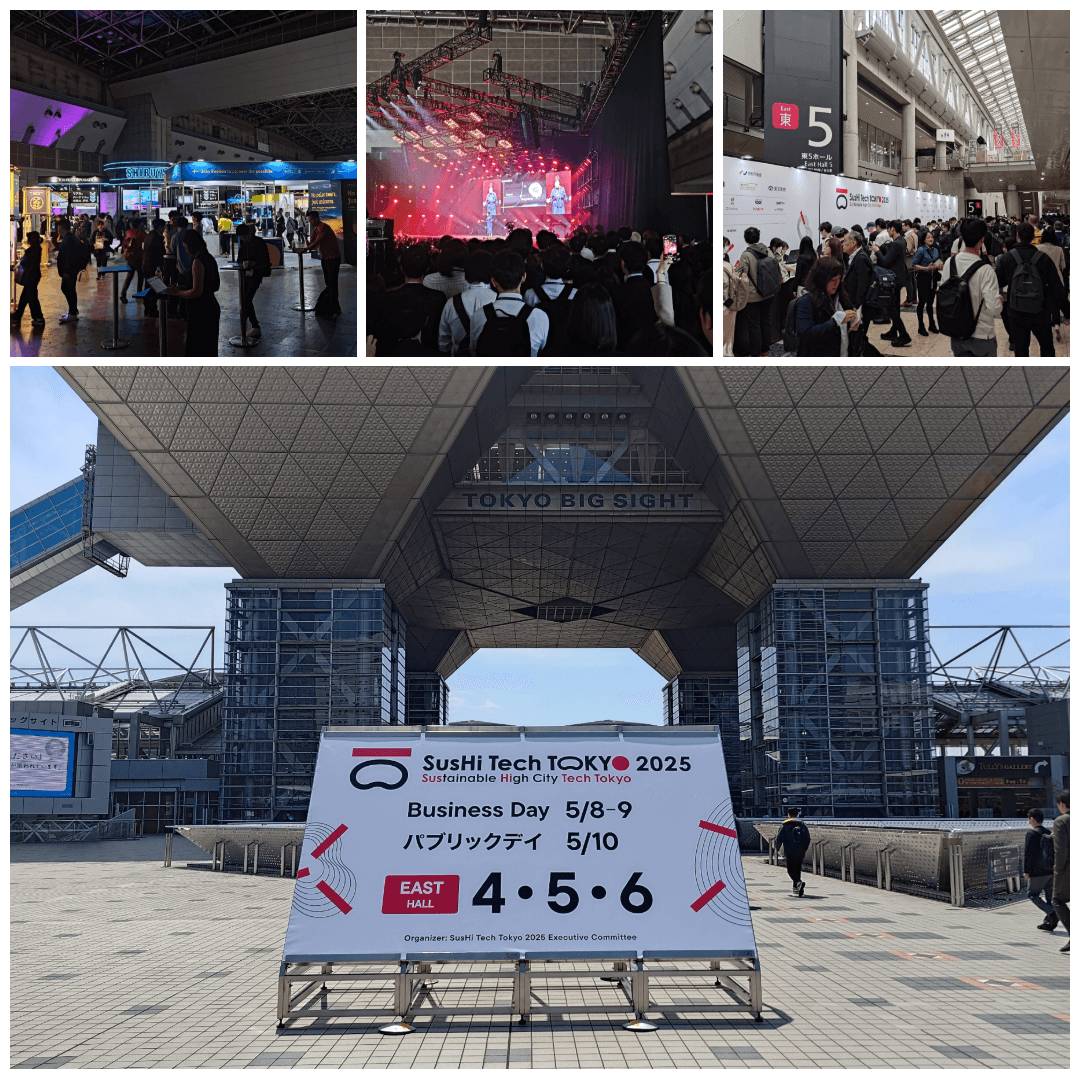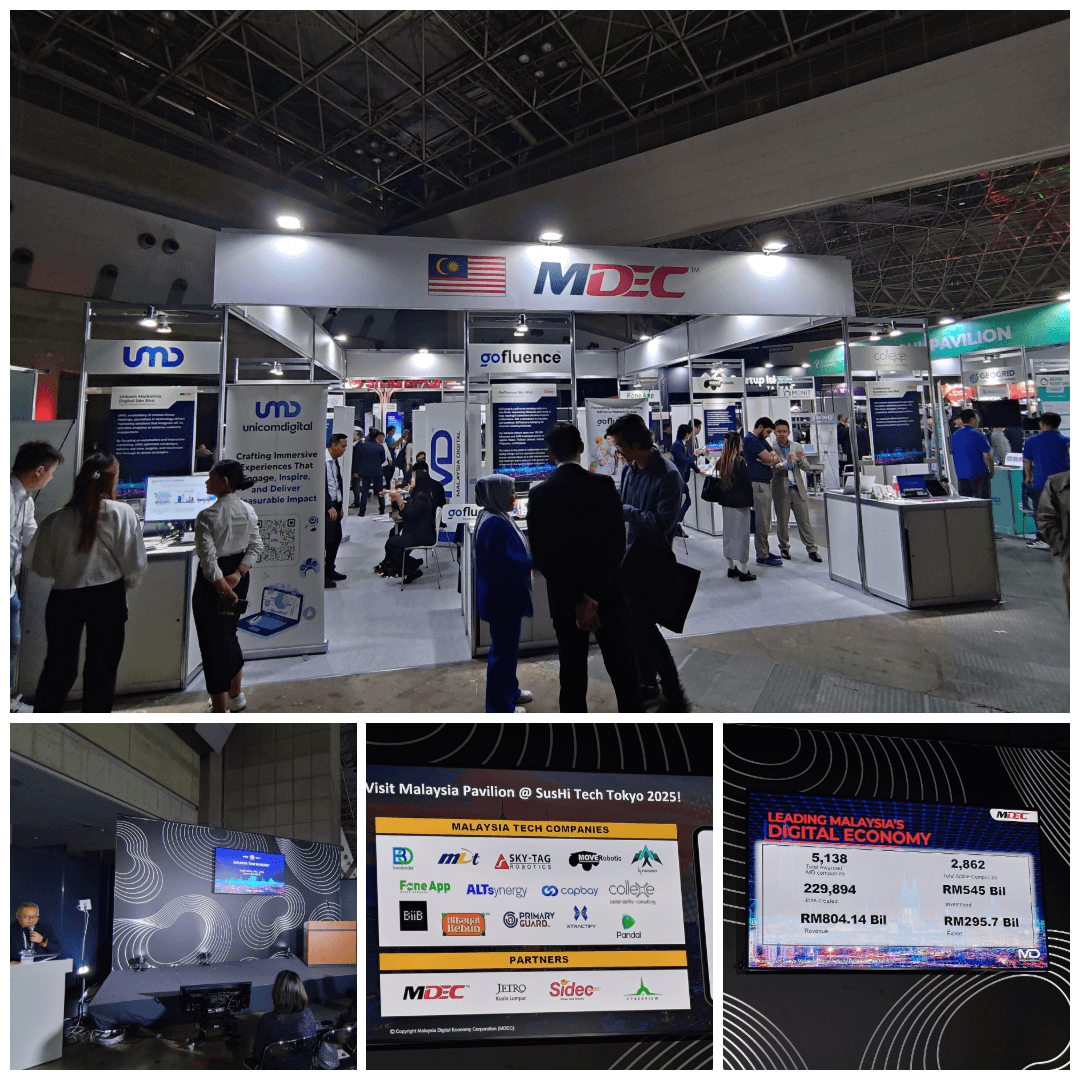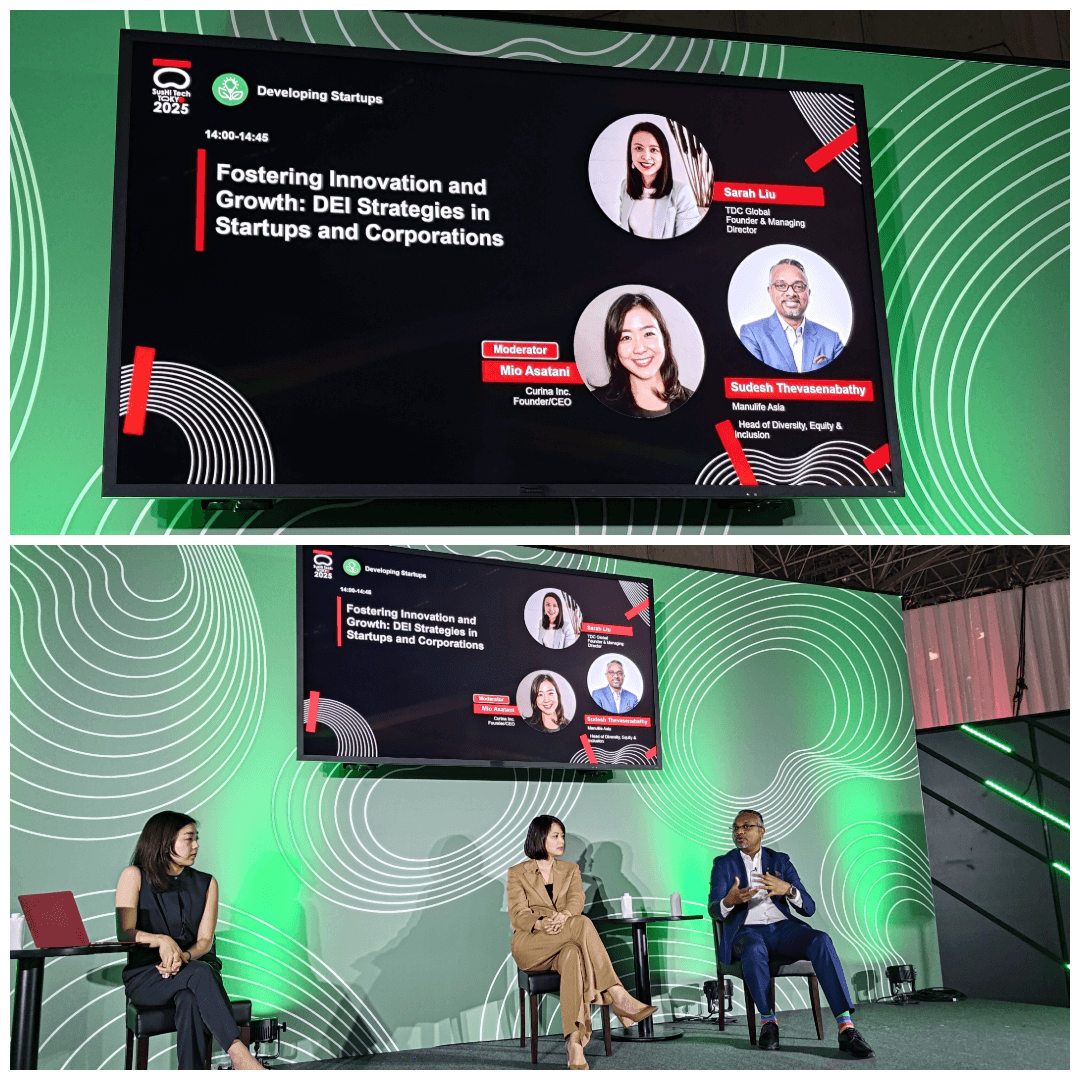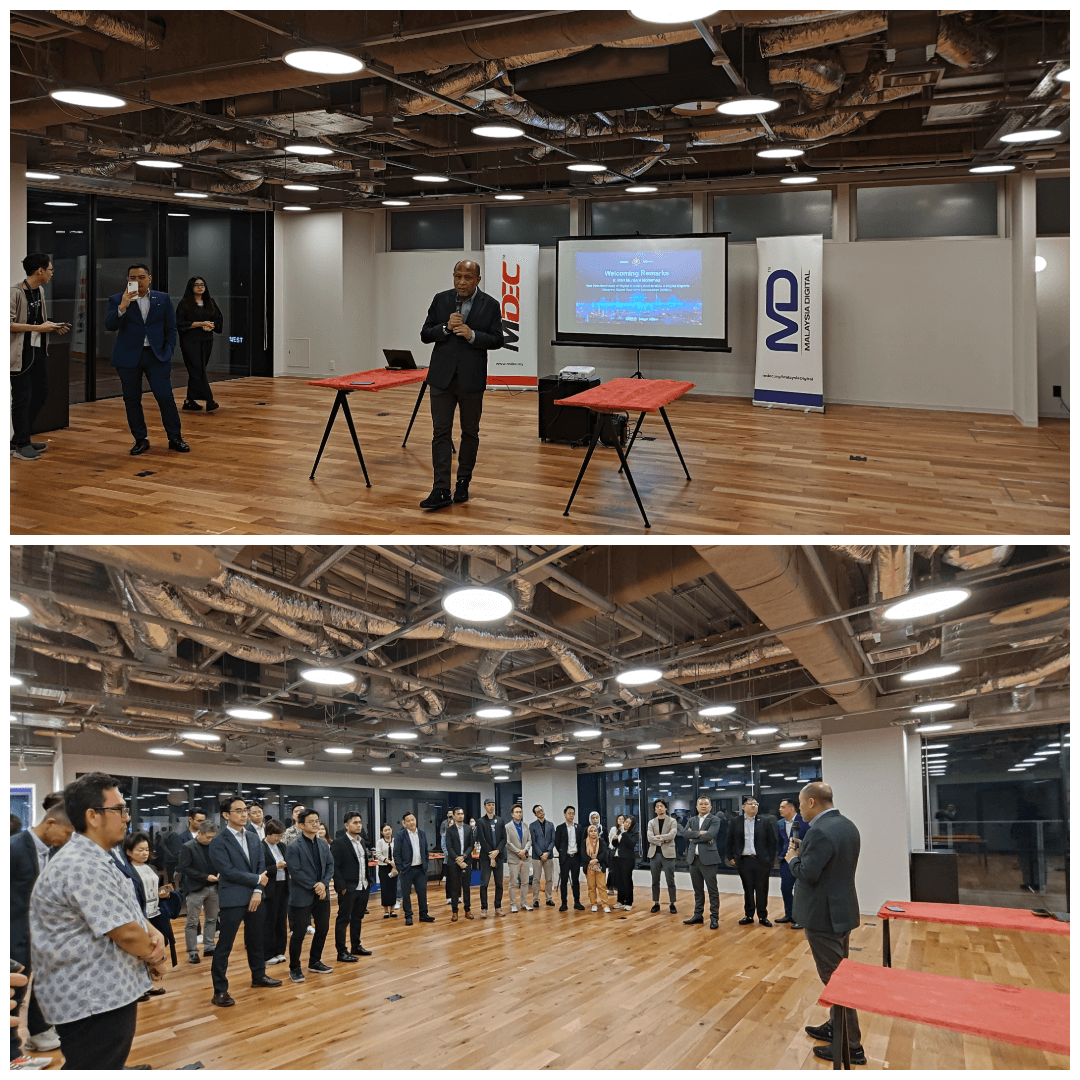SusHI Tech Tokyo 2025: A Hub for Innovation and Networking

I attended for the first time SusHI Tech Tokyo held at Big Sight last week. SusHI Tech Tokyo is one of the largest startup conferences in Asia. It's a 3-day event from May 8 to May 10, but I only went for the first 2 days. The first two days are known as "Business Days," where you try to get work done. The last day was "Public Day," when members of the public could experience the conference.
When I signed up, the secretariat sent me a discount coupon to give to my network, which I wrote about here.
Getting There and Away
Big Sight can be reached via public transportation from the Kokusai-Tenjijo Station (R-03) or Tokyo Big Sight Station (U-11).
They also have a free shuttle bus service on a fixed schedule leaving from the Tokyo Innovation Base (TiB) in Yurakucho. Now this is a wonderful thing since I take the Yurakucho line into the city. If you can get yourself to Yurakucho, you'll save some money and more walking if you take the shuttle bus into the venue from TiB. It takes around 25 minutes for the bus to reach Big Sight from TiB.
Day 1
I've decided that my first day will be filled with meetings, so I had five meetings lined up. The idea is to find partners who would work with us on improving online marketing for startups and small businesses through partnerships using Kafkai.
We're looking for resellers! If you're interested in partnering with us to help your customers create strategic and competitive content, we'd like to hear from you! Read more about our reseller program here.
SusHI Tech has a matchmaking feature that allows you to search for participants based on criteria you've set and request a meeting. If you match, you'll be able to set a time and a space to meet your counterpart.
I made the mistake of leaving my matchmaking setting as "free space" and not setting it to use the meeting spaces. SusHI Tech folks, if you're reading this: The UI wasn't really clear on how to do this, and the UX didn't bring this up as something you can set. Maybe something for you to fix next year.
So we ended up talking while standing up most of the time at some corner of a booth. In a way, that forced all of us to get to the point, but yeah, I think this could have been done better.
There were 13 stages in total, and most sessions ran concurrently. It is impossible for you to catch all of them, but I did manage to sit down and watch some of the sessions that interested me.
Session: Building the Infrastructure of Society with AI by Google for Startups
When I saw the title of this session on the timetable, I was intrigued. An "Infrastructure Of Society With AI"? What is that?
We had Mo Batran, an enterpreneur from Egypt currently working on his startup here in Tokyo and California, Alchemist Japan's Managing Director Ryoko Manabe, Emiri Grimes, CEO of Yuimedi Inc and Shino Tsuchiya from Google For Startups as the moderator.
Japanese AI startups are increasingly focused on building global businesses, a trend supported by accelerators like Alchemist Japan and Google for Startups. These programs emphasize scalable products, diverse teams spanning multiple countries, and securing international investment, as exemplified by xMap's success in raising millions with half from outside Japan.
Google for Startups and Alchemist Japan offer comprehensive support, including mentorship, cloud credits, and access to global networks, designed to overcome the challenge of Japanese startups often thriving locally but struggling to expand internationally. Alchemist's programs culminate in a U.S.-based follow-up phase, while Google’s new Founders at Campus initiative provides lifelong support without equity.
Ultimately, the goal is to foster a stronger Japanese startup ecosystem with global reach, encouraging founders to embrace diverse teams, leverage available resources, and build products without geographical limitations. This collaborative effort aims to connect Japanese innovation with international markets and drive sustainable growth for startups operating from Japan.
Since this particular session is sponsored by Google For Startups, there was a significant marketing pitch about how Google can help startups; however, the key takeaway that I understood from the session is that building an ecosystem for startups and focusing on AI within that ecosystem can also contribute to developing the infrastructure that our society needs.
Session: Malaysia Tech Spotlight
The next session I caught was the Malaysian Tech Spotlight session.

Malaysia's digital economy ecosystem, spearheaded by the Malaysia Digital Economy Corporation (MDEC) and Selangor, seeks to enhance AI, cybersecurity, and startup scalability on a global level. The initiative addresses challenges such as gaps in customer insights, cybersecurity talent shortages, and brand loyalty fragmentation. By fostering regional integration and digital adoption in sectors like finance and agriculture, Malaysia aims to contribute 25% to its GDP via the digital economy by 2035.
To address these challenges, the ecosystem promotes policy support, tech zones, and open partnerships. Key strategies include welcoming foreign founders with policy and visa support, developing Malaysia's largest AI and tech accelerators, and creating an IC Design Park to support semiconductor and AI startups. MDEC supports over 4,000 digital companies, while SIDEC focuses on GPU-backed AI startup scaling. The initiative also emphasizes talent upskilling, targeting 60,000 engineers, and nurturing collaborations with Japanese corporates to facilitate market localization.
The outcomes are promising, with initiatives like FoneApp and Extractify seeking investors and showcasing innovative solutions at the Malaysia Tech Showcase. FoneApp's revenue is projected to hit RM60 million by 2024, while Extractify's AI technology enhances marketing insights. The digital economy initiatives have generated RM804.14 billion in revenue and created 229,894 jobs. Malaysia's strategic focus on AI, semiconductors, fintech, and cybersecurity positions it as a regional leader, with significant contributions expected from startups aiming for IPOs and Series B investments.
🇲🇾 Malaysian Startups at SusHI Tech Tokyo 2025
Here are some of the Malaysian startups featured during the Malaysia Pavilion showcase at SusHI Tech Tokyo 2025:
-
Boostorder AI-powered B2B order and payment automation platform for brands and distributors.
-
Sky-Tag Robotics Provides automation solutions for industries like automotive, medical, and semiconductors.
-
Move Robotic Specializes in warehouse automation with autonomous mobile robots and storage systems.
-
Alphaswift Industries Offers custom drone solutions for delivery, agriculture, and surveillance applications.
-
FoneApp Hyper-reward app turning daily spending into community-based rewards.
-
CapBay Provides supply chain financing solutions for SMEs.
-
Collexe Consulting Offers IT services and sustainability consulting for businesses.
-
BiiB Mobile app platform for organizing and participating in running challenges.
-
Hikayat Kebun Promotes sustainable agriculture and gardening practices.
-
Primary Guard Provides comprehensive cybersecurity solutions and IT infrastructure management.
-
Xtractify AI-powered business solutions for document processing and automation.
-
Pandai Online learning app helping students improve grades through quizzes and educational content.
Day 2
For Day 2, I decided to spend time working through the booths and meet as many people as I could.
One thing that I love about going to conferences or trade shows is that you'll know basically anyone who goes there is there to meet people or learn new things. I sat with a random stranger during lunch because tables were limited, but by the time I finished my lunch, the person sitting with me was not a stranger anymore. I visited his booth, which was Review, that has an interesting business model of making public data available for businesses to work upon. They have marketing reports out for you to read here and here.
Infloso is another company I stopped by to say hello. Their CEO, Utkarsh, was on the HackerNews (HN) Tokyo Slack I was in and announced they would be exhibiting in SusHI Tech at the India Pavilion. Their product is a dashboard where businesses can plan, execute, and track their online marketing campaigns all from a single place. Think of your Google, Facebook, X, and Instagram ads all being done from one single dashboard.
I also stopped by NunoX Technologies, a company that creates software that helps you visualize and simulate different types of fabric. NunoX scans fabrics, transforms them into data, trains their AI, and allows you to experiment quickly with how combinations of fabric will look before you actually start producing them.
One other notable company that I stopped by to talk to was VRITIMES. They offer press release coverage to media outlets. The differentiator that they have is that they are focused on media outlets in Southeast Asia. A lot of companies in Japan now are looking overseas to expand their market, so something like this, I imagine, would be of interest to them.
Session: Fostering Innovation and Growth: DEI Strategies in Startups and Corporations
One of the memorable sessions I sat through on the 2nd day was about Diversity Equity and Inclusion (DEI):
In my community work, I was one of the founding members of the Python Software (PSF).s Diversity And Inclusion Workgroup. I'm also one of the board members for the Python Asia Organization non-profit, and one of the main goals that we have with these initiaitves is to increase diversity and inclusion within our tehcnical communities of Python programmers and user.
When I saw this session on the timetibale, I was naturally interested to hear the experiences of the panelists on fostering and executing DEI strategies within their own organization.
The panelists were Sarah Liu, Founder and Managing Director of TDC Global, Sudesh Thevasenabathy from Manulife based in Hong Kong with Mio Asatani, the Founder/CEO of Curina Inc. acting as moderator.

Embedding Diversity, Equity, and Inclusion (DEI) into business strategy, rather than treating it as solely an HR function, is crucial for innovation, product design, and sustainable growth. Discussions highlighted the importance of authentic DEI initiatives, moving beyond superficial efforts, particularly as the term has become politicized in some Western contexts. Companies should proactively audit their DEI readiness, engage leadership, and prioritize inclusive hiring practices, especially startups, which can design inclusivity from the outset.
Successful DEI implementation requires data-driven approaches to challenge assumptions and correct systemic imbalances, exemplified by Manulife’s increase of women in leadership from 13% to 42% in five years. Asian companies are uniquely positioned to lead DEI efforts, leveraging cultural strengths like respect and hospitality to foster inclusive environments and attract diverse talent, ultimately expanding market reach and fostering business relevance. Boycotts against companies perceived as lacking authentic DEI commitment demonstrate the critical importance of earning customer trust and demonstrating genuine commitment.
Measuring DEI progress initially with KPIs is essential, but the ultimate goal is to integrate inclusion into the company culture, eliminating the need for separate tracking. This shift requires leadership accountability, a commitment to challenging bias, and a recognition that inclusive hiring isn't just about fairness: It's about future-proofing businesses and accessing broader, more creative talent pools.
Malaysia x Japan Industry Networking Night by MDEC
Malaysia's Malaysia Digital Economy Corporation (MDEC) hosted a get-together after the end of the 2nd day. I was invited and had the opportunity to meet up with Malaysian and Japanese business leaders. As is customary for a Malaysian gathering, there was Malaysian food, which we all enjoyed while talking to each other. There were around 40 people at the event, from startups, private and public businesses, and also reps from the Selangor State government.
The Malaysian startups who were with the Malaysian contingent to present themselves during SusHI Tech Tokyo 2025 are very interested in finding opportunities to expand into Japan. I was happy to share my insights on the business landscape, the opportunities, and the challenges of penetrating the Japanese market.
You can see more pictures of the event from MDEC's media releases on X

Wrapping Up
I had fun, managed to get some walking done, met interesting people, and learned a lot during the two days of SusHI Tech Tokyo. I do not expect less when I participate in a trade show. There's a big chance I will be joining again next year if I'm in town, and if you're in tech, I think you should too.
Some random notes to myself if I'm coming again next year:
- All in all, I managed to exchange business cards with over 30 people, and hopefully, we can create more meaningful connections going forward.
- I walked a total of 20KM and 30,000 steps over the course of 2 days.
- Bring your own lunch: The lunch lines are long, and the selection might not be much and is also relatively expensive. There are enough spaces to eat.
- Set your meeting settings to use the meeting space that they provide.
- Use the shuttle bus if they have it again.
Thanks for reading this short report, and maybe I'll see you in the next year's SusHI Tech Tokyo! 👋🏾